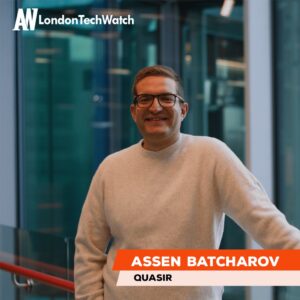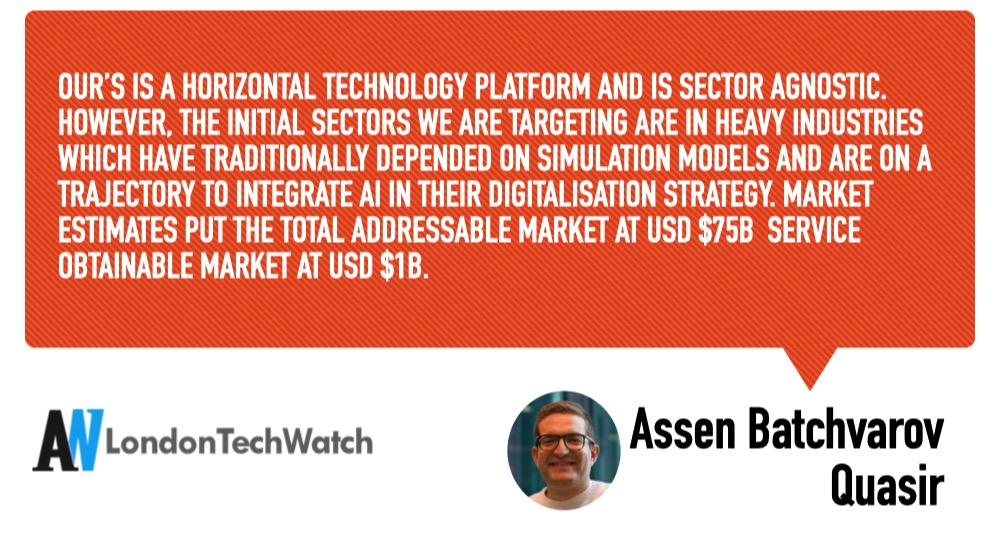Digital twins are digital representations of a physical object, process, service, or environment that emulates its real-world counterparts. Digital twins have proven popular in heavy industries like aeronautics, manufacturing, pharmaceuticals, and consumer goods where simulations are critical and failure of physical objects can be costly in terms of both time and money. Quasir is a platform that not only allows organizations to manipulate and use digital simulations but also integrates data, no matter the source, and AI into workflows. These heightened capabilities have fermented an emergent field called SimOps that allows organizations to collaborate, simulate, and integrate using low-code frameworks. A spin-out of a joint collaboration between Turing and Imperial College London, Quasir plans to initially focus on heavy industries to optimize monitoring, control, automation, and performance. However, the platform is versatile and sector-agnostic and can be used to solve some of the world’s pressing challenges like environmental contamination detection and wind farm placement.
London TechWatch caught up with Quaisr Product Manager Assen Batchvarov to learn more about the business, the company’s strategic plans, recent round of funding, and much, much more…
Who were your investors and how much did you raise?
The pre-seed funding round was led by Crane Venture Partners, with the participation of Acequia Capital, Hybris Founder Carsten Thoma, Encord Founder Eric Landau and additional strategic angel investors.
Tell us about your product or service.
Quaisr is a digital-connectivity platform that scales simulation-backed AI workflows to mission-critical operational deployments, helping engineers to solve pressing problems in design, monitoring, optimisation, and control.
What inspired the start of Quaisr?
 While working at Imperial College London and the Alan Turing Institute, our founding team was applying cutting-edge digital simulation and AI technology to solve problems across the heavy industry, when we realised that the adoption is very slow due to the lack of a collaborative connectivity platform. Quaisr was born to help deploy and scale bespoke modeling methodologies across a multinational, democratise these complex simulation cum AI workflows to non-specialist users in a low code/no-code fashion to speed up productivity, efficiency, and time to market.
While working at Imperial College London and the Alan Turing Institute, our founding team was applying cutting-edge digital simulation and AI technology to solve problems across the heavy industry, when we realised that the adoption is very slow due to the lack of a collaborative connectivity platform. Quaisr was born to help deploy and scale bespoke modeling methodologies across a multinational, democratise these complex simulation cum AI workflows to non-specialist users in a low code/no-code fashion to speed up productivity, efficiency, and time to market.
How is it different?
Many techniques that have seen universal uptake in tech companies, for example, DevOps and MLOps, are now making their way into the heavy industries where process simulation is critical – manufacturing, pharmaceuticals, and consumer goods. We see a SimOps category, combining simulation with operational data, as the natural progression, and Quaisr is pioneering the first set of end-to-end tooling for engineers and research scientists to automate their processes at scale, and in a self-service fashion.
What market you are targeting and how big is it?
Our’s is a horizontal technology platform and is sector agnostic. However, the initial sectors we are targeting are in heavy industries which have traditionally depended on simulation models and are on a trajectory to integrate AI in their digitalisation strategy. Market estimates put the total addressable market at USD $75B service obtainable market at USD $1B.
What’s your business model?
It is a SaaS B2B model.
How are you preparing for a potential economic slowdown?
Our focus is on customer success. Creating value for our customers will ensure resilience of Quaisr even in the toughest climates.
What was the funding process like?
It was long, but rewarding in the end.
What are the biggest challenges that you faced while raising capital?
We formed the company in the middle of a pandemic and a tough macro-economic climate which were not very conducive to raising capital.
What factors about your business led your investors to write the cheque?
The idea behind the Quaisr platform, recurring pain points across multiple customers, and the brilliant team with deep technical expertise to deliver a complex product like this. Across the wider team, Quaisr has 12 PhDs. Amongst us, we have extensive professional experience across defence, consumer goods, built environments, and energy sectors.
The idea behind the Quaisr platform, recurring pain points across multiple customers, and the brilliant team with deep technical expertise to deliver a complex product like this. Across the wider team, Quaisr has 12 PhDs. Amongst us, we have extensive professional experience across defence, consumer goods, built environments, and energy sectors.
What are the milestones you plan to achieve in the next six months?
- Complete two new Quaisr platform releases
- Accelerate customer acquisition
What advice can you offer companies in London that do not have a fresh injection of capital in the bank?
Keep talking to as many VCs and angels as possible.
Join accelerator programmes relevant to your product. They are great for picking up new skills, talking to new prospects, and getting introductions to VCs and angel investors.
Where do you see the company going now over the near term?
Our near-term priorities are around nailing our go-to-market strategies and improving customer satisfaction.
Where’s the best place to hold a team offsite?
We held a team offsite in the Peak District. The weather was great and the walks were breathtaking. We would highly recommend it.






